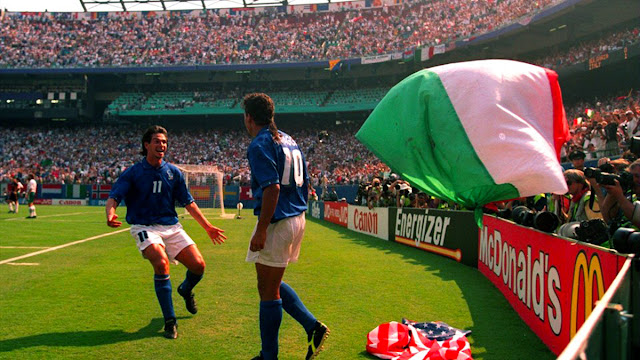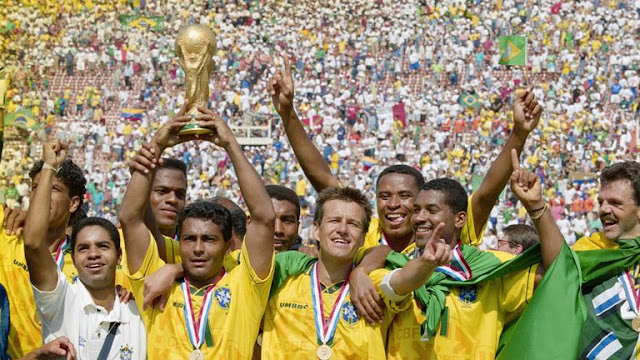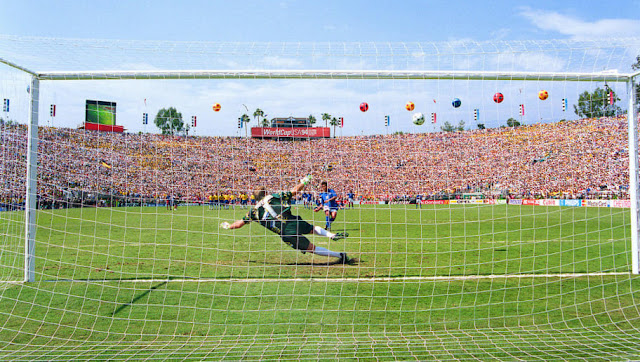Italy played their best match of the competition to defeat Bulgaria by two goals to one and reach the World Cup final. Roberto Baggio starred late in Italy's previous knockout matches, but here he scored two first half goals in five minutes - one spectacular, the other expertly clinical - to give his nation a lead that would be ultimately unassailable.
Bulgaria were correctly awarded a penalty by the French referee Joël Quiniou, but were left to rue not being awarded another, in the second half. Bulgaria defeated but with a great sense of national pride; Italy were the deserved winners and had laid to rest the ghost of their 1990 semifinal with Argentina.
Joël Quiniou throughly deserved his fourth appointment of the competition having handled three games (
SWERUS -
GERKOR -
BRAUSA) successfully so far. And again, the Frenchman refereed well, arguably this was the easiest game he had at the tournament. He was right to award Bulgaria a penalty at the end of the first half, and later as he looked out to linesman Roy Pearson when Alessandro Costacurta allegedly handled, the Englishman's flag stayed down. A very famous incident in the Bulgarian psyche to this day.
Let's start by analysing the two penalty incidents.
Key Match Incidents
44' - Penalty given to Bulgaria
Rather well seen by the referee in my view - Alessandro Costacurta clearly trips Nasko Sirakov inside the penalty area. Perhaps some would have turned their cognitive attention to Sirakov's potential collision with the goalkeeper, but Quiniou kept his trailing eye on the first challenge, and correctly punished its foul nature. Correct call.
Actually, Costacurta has denied an obvious goal-scoring opportunity with this foul, but given the criteria that being (clearly) the last man is paramount for the tournament, then Quiniou was quite justified in not giving a sanction.
70' - Potential penalty to Bulgaria
Having conceded one penalty (and having been booked out of the final), Alessandro Costacurta should have been punished again inside his own box. While the Italy defender does make a play on the ball after Emil Kostadinov's touch, his semi-automatic push of the ball away had to be punished.
Joël Quiniou does not have the best chance to detect that -
1) the long ball forward is very quick and Quiniou gets understandably caught a way away.
2) the incident takes place on his zero insight angle side, though he does have a chance to see the handling offence with a better
Roy Pearson is better-placed to detect the offence, and indeed Joël Quiniou is said to have very clearly looked out to linesman Pearson, whose flag remained down. To be fair to the Englishman, being as close as he was, it is not surprising that he didn't have the right idea (especially if he saw Costacurta clearly play the ball which muddled it a bit) - but he should have indicated a penalty here, especially having been given the cue by the referee that the decision was clearly his.
This would have been perhaps the most momentous decision ever taken by linesman at that point in time, and it is easy to forget oneself and how it has changed nowadays; that should be stressed before castigating any of the officials involved.
CRUCIAL MISTAKE
Balance
Maybe that eleven players were one caution away from missing the next match informed Joël Quiniou to operate quite an idiosyncratic card selection in this match. In the end only Costacurta fell from the disciplinary tightrope, and his caution was very clear and unambiguous.
Frenchman ignored a very clear SPA card (borderline DOGSO) at 32'; he showed no cards in the first half. Furthermore, it is hard to say that fouls at 35', 82' and 83' were more careless than cautions given at 66' and 84'. Quiniou paid particular attention to which sanctions would be tactically valuable in this match, and to be fair his tactic was successful. Referee should be praised for second half cautions for simulation and holding offences.
Bulgaria appealed for penalties at 11' and 29' - both were perhaps a bit more credible than they seemed. I would argue that the second Italy goal should have been disallowed for a backing in foul that prevented a defender who could have reached the ball from doing so; no Bulgaria appealing is perhaps a comment on how not-sensible it would be to have done that.
Unlike the quarterfinal matches, there isn't too much to say about the referee's performance here! Bulgaria players dissented even wildly at 70', but besides that Quiniou's calming style aroused respect from both sets of players throughout. Everyone was focused on football and seeing the referee as an unobtrusive force for good, French referee made his life easy.
Roy Pearson had a good afternoon determining offsides, unlike Dane Carl-Johan Christensen who made three important mistakes disadvantaging victorious Italy (58', 86', 88') albeit in rather dynamic situations.
Joël Quiniou - 7,9(4)
Carl-Johan Christensen - 8,0
Roy Pearson - 7,9(4)
Philip Don
FRA, DEN, ENG | Bulgaria 1-2 Italy
Semifinal |

Kostadinov (53') - Simulation
Lečkov (66') - Tackle
Jankov (84') - Charging | 
Costacurta (62') - Tackle
Albertini (81') - Lack of Respect (Holding) |



Might have missed it, but what do you think of the penalty appeal at 89'? It's awkward and it would be soft, but it's a silly, silly challenge to make and I find it difficult to argue that it's not a careless foul with clear contact.
ReplyDeleteNot for me. Lečkov tries to engineer a foul by positioning himself where the defender is about to kick the ball.
DeleteLečkov's reaction is a signal in that direction. If you had been denied a clear penalty in the last minute of a WC SF, you would be going crazy (like 70'), not just the simple frustration he shows.
Of course, I would support a penalty call, but no whistle is much better IMO.
Perhaps the weakest performance by Quiniou. He was unlucky regarding the rather decisive missed penalty - if 89' should have been one is at least debatable. The one he gave was rather clear though.
ReplyDeleteAgain, Quiniou had a decent match by being very calm and doing his job, even if his disciplinary line lacked consistency more often than not. Still, the cards given were quite sound (surpress attempts of winning free kicks too easily, challenges from behind, late challenge, blatant LoR, reckless play).